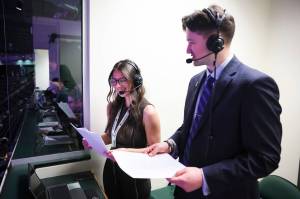Captain Kangaroo dies
Published 9:00 pm Friday, January 23, 2004
Bob Keeshan, television’s beloved Captain Kangaroo, who entertained and educated millions of children for more than 30 years, died Friday. He was 76.
Keeshan, who lived in Hartford, Vt., died after a long illness at a hospital in Windsor, his family said.
"Bob Keeshan was a true pioneer in children’s television whose legacy goes unmatched," CBS Chief Executive Leslie Moonves said in a statement Friday. "He was a great entertainer, showman and innovator, and he will always hold a special place in the history of CBS and the hearts of television viewers."
Launched by CBS in 1955, the live, hourlong "Captain Kangaroo" quickly captured a huge following among young baby boomers for whom the 8 a.m. show became as much a staple of their morning routines as a bowl of Corn Flakes.
As the grandfatherly captain, Keeshan presided over his Treasure House, which an early CBS publicity release described as a "private wonderland of childhood."
Keeshan was joined by Treasure House regulars Mr. Green Jeans (actor Hugh "Lumpy" Brannum), various puppet friends, including Mr. Moose and Bunny Rabbit, as well as Dancing Bear and the venerable Grandfather Clock.
The captain’s gentle and calm demeanor and the low-key atmosphere of the Treasure House was in sharp contrast to most other early children’s shows. As a review in Newsweek pointed out, "There is, mercifully, no studio audience of hyper-stimulated youngsters."
A television pioneer who was the original Clarabell the Clown on one of the medium’s first big hits, the "Howdy Doody" show, Keeshan had his own ideas about children’s programming.
The "Tom Terrific" cartoons that aired on the show were nonviolent, for example. And Keeshan made a point of teaching his young viewers — his primary audience was children ages 4 to 6 — lessons in values such as kindness, sharing and honesty. He even read one book a week to his audience.
Keeshan believed he knew the secret to staying on the air a long time and it was not violence.
"Violence is part of life, and there is no getting away from it," he once said. "But there is also gentleness in life, and this is what we have tried to stress on our shows."
Keeshan was just 28 when he first donned a bobbed wig, walrus mustache and makeup to make him look the part of the grandfatherly Captain Kangaroo — along with the uniform that had deep, kangaroo pouch-like pockets that gave him his name.
Over the years, he needed less makeup to play the part, and his own hair turned gray, then white. As he liked to say, "I have grown into the part."
Keeshan’s TV image was so convincing, he wrote in his 1995 memoir "Good Morning Captain," that his youngest daughter, Maeve, visited the set early one time and sat in the captain’s lap for a chat.
When Keeshan returned to the set out of costume, his excited daughter told him, "Daddy, Daddy, you just missed Captain Kangaroo!"
The show, which ran for 29 years on CBS and later on PBS for six seasons, won five Emmy Awards and three Peabody Awards.
"If you were going to build a monument to commercial children’s television and you had to put a statue on top of it, it would have to be Bob Keeshan," Robert Thompson, director of the Center for the Study of Popular Television at Syracuse University, said Friday.
Both Keeshan and the late Fred Rogers, who died last year, were "the kings" of the gentler, slower-paced form of children’s television programming that emerged in television’s early days, Thompson said.
In his later years, Keeshan was active as a children’s advocate, writing books, lecturing and lobbying on behalf of children’s issues.
He remained critical of violence in children’s television shows and always stressed the importance of good parenting.
"Parents are the ultimate role models for children," Keeshan said. "Every word, movement and action has an effect. No other person or outside force has a greater influence on a child than the parent."
In 1987, he and former Tennessee Gov. Lamar Alexander co-founded Corporate Family Solutions, an organization that provided day-care programs to businesses around the country.
Keeshan’s wife, Jeanne, died in 1990. They had three children: Michael, Laurie and Maeve.
"Our father, grandfather and friend was as passionate for his family as he was for America’s children," Keeshan’s son, Michael, said in his statement Friday. "He was largely a private man living an often public life as an advocate for all that our nation’s children deserve."




